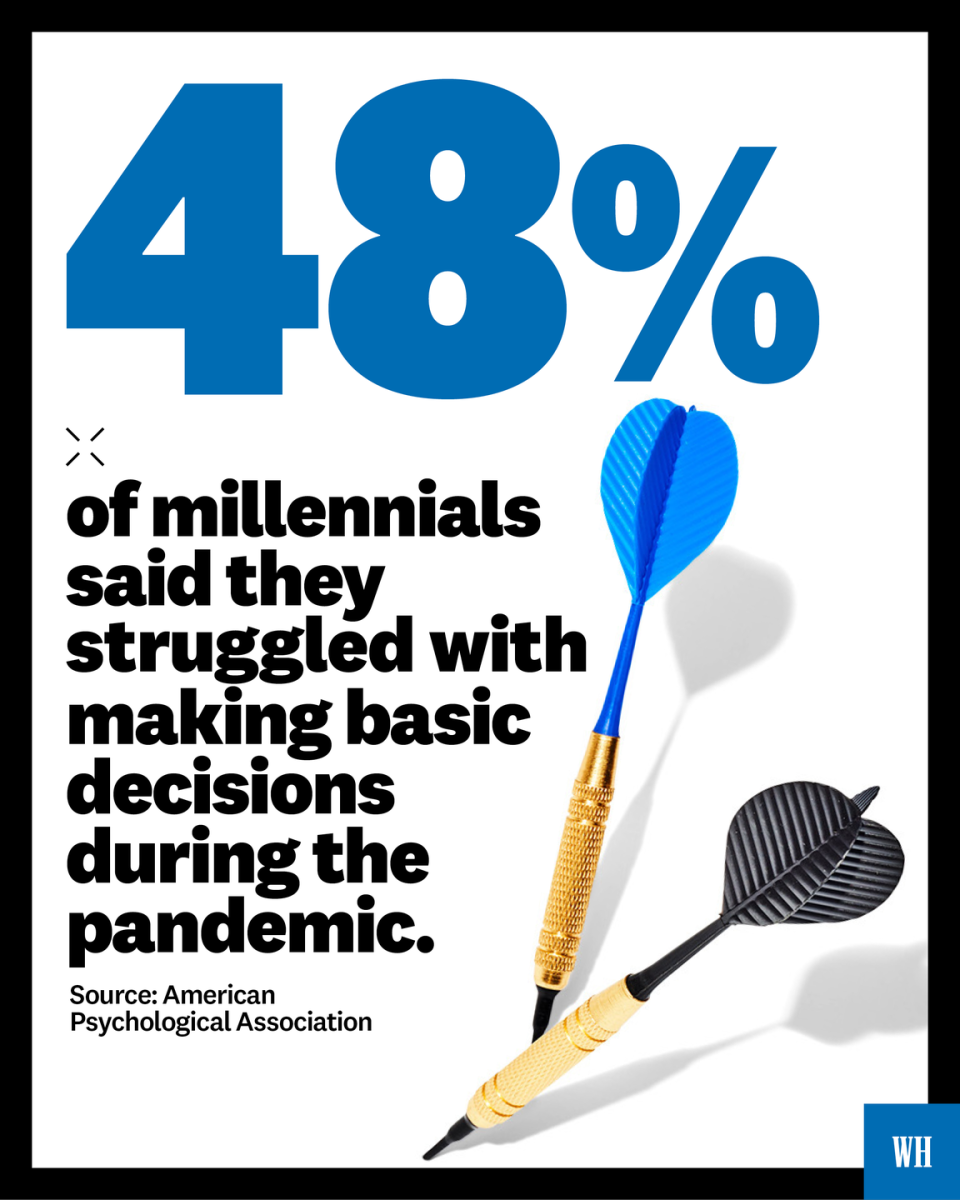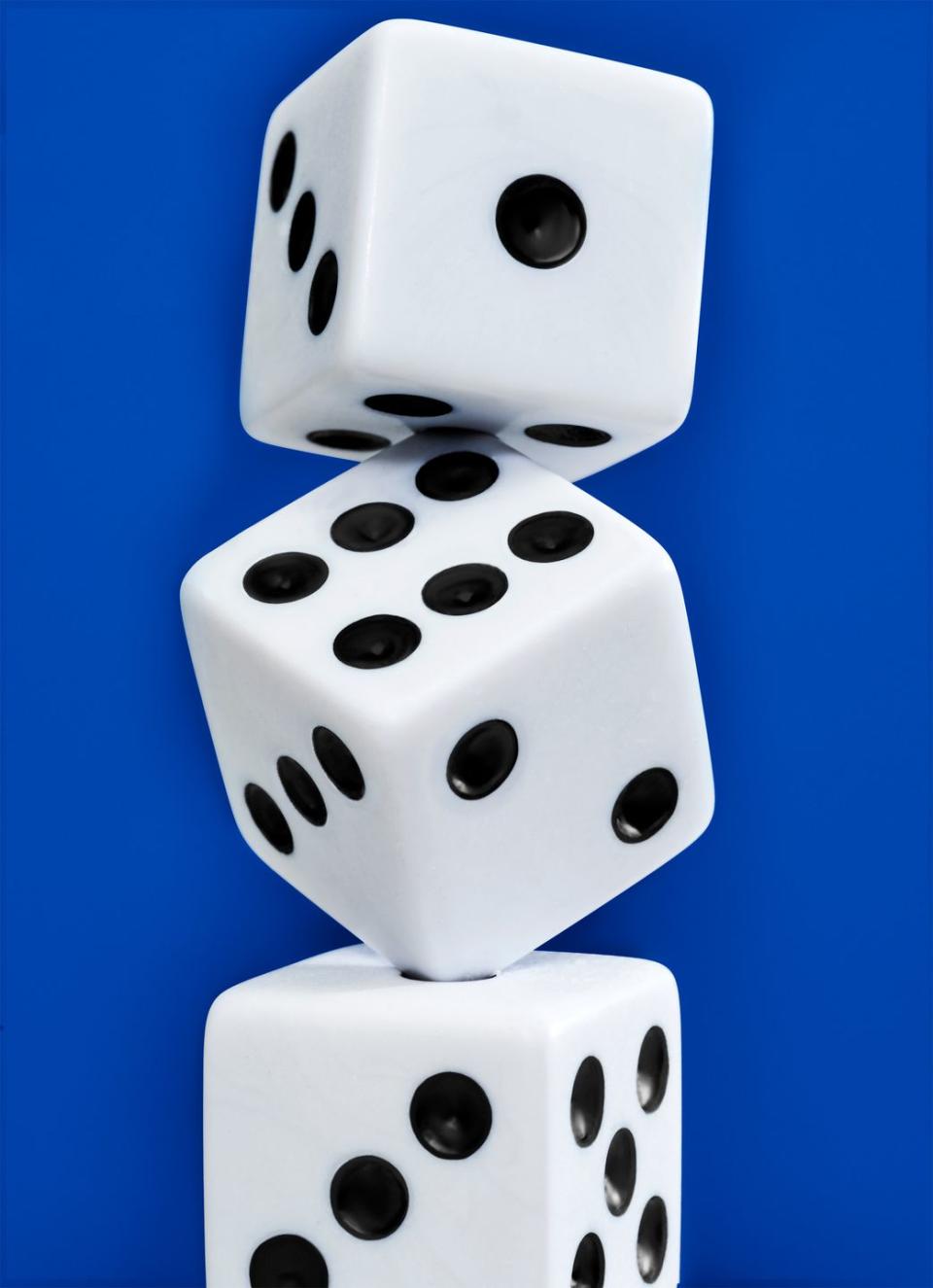If You Struggle With Making Decisions, Don’t Ask The 'Magic 8 Ball'—Read This

"Hearst Magazines and Yahoo may earn commission or revenue on some items through these links."
Imagine if every time you’re struggling to make a decision, a giant, colorful wheel appears
before you. On each tab, YES or NO is written in bold letters. Like clockwork, it pops up whenever you feel stuck—your own personal wheel of fortune, only it never asks you to buy a vowel.
If you are me, you already exist in this reality, and you’re currently hoping the wheel lands on YES. I’ve just asked the website Wheel Decide whether I should order Thai for dinner. The virtual whirligig claims to be the “ultimate decision maker,” and, considering the website is pinned to the favorites tab on my phone’s Internet browser, I tend to agree.
Decision-making has never been my strongest muscle. It’s not that I dislike making decisions, but I always fear I am making the wrong choice—even with something as simple (seemingly) as dinner. What if I order food and it takes forever to arrive? What if I regret what I order and end up just wasting money? What if this so-called inconsequential decision actually has serious lifelong consequences? When worst-case scenarios start to stack up in my mind, the Wheel Decide website takes away the pressure. Like flipping a coin, spinning the wheel gives me insight into what I actually want, or a reprieve when I really don’t know what to do. My instinct to go to the website isn’t about having a choice made for me, but about seeking out a place to pause and evaluate.

Granted, I don’t need to use the virtual wheel in every situation—I make plenty of decisions daily without its help—but when I do, it’s usually because I feel stuck.
Why is decision-making so hard?
The typical person makes around 35,000 choices each day, according to research in the Journal of Health Psychology. Though you may not even realize you’re making all these decisions, especially ones to do with daily life, it’s very normal to get bogged down by the transparent volume. This can lead to decision paralysis, says Lace Padilla, PhD, a computer science and psychology assistant professor at Northeastern University. Ironically, because we have no choice but to play the numbers game over and over again, sitting on the bench sometimes feels like the safest bet. The choice itself may not be difficult, but your mental decision-making energy may be so maxed out that you just don’t want to think about it, says Padilla.
It’s not just decision fatigue that can leave you stranded at a crossroads—confidence can be a factor too. When people are indecisive, “often it’s because they are having to take control of a situation they feel unprepared for, or they’re having to demonstrate certainty in something where they don’t necessarily have control,” says Peter
Atwater, an adjunct professor of economics at William & Mary and author of The Confidence Map: Charting a Path From Chaos to Clarity. “Our decisions reflect the [level of] confidence that we feel.” Even with a low-stakes sitch like ordering dinner, I may feel solid enough to know what I want (I have a go-to spot, after all), but decision fatigue takes over when I try to weigh the other variables—like cost and time.
With too little sureness, you can wind up stuck in your comfort zone; too much, and you might take an outsize risk. “Our best decisions are made when we are open to the possibility that things could go well or that things could go poorly and we are prepared for either outcome,” Atwater says.
But that sweet spot can elude you, especially if you’re dealing with mental health issues, like depression. If you have low self-esteem as a result of a mental health condition, you may feel less able to trust yourself to make the right decision, or even a good decision, says Paul Greene, PhD, a clinical psychologist based in New York City specializing in cognitive behavioral therapy. If this struggle resonates with you, working with a professional can help, because they can serve as a sounding board.
So, sure, spinning a wheel can be a fun—and surprisingly informative—way to uncover what you really want. But if you, like me, are ready to ditch the decision-making difficulties once and for all, reading this doubt-busting guide is the right choice (promise!).
If you’re overwhelmed with options: Start the timer.
When you’re spoiled for choice, limit your options to a few, says Margie Warrell, PhD, a motivational speaker and author of You’ve Got This!: The Life-Changing Power of Trusting Yourself. Say you’re shopping for a new lipstick. Instead of trying on every possibility at Sephora, pick out three you like and choose among that curated group, she says.
Here’s a secret for the no-stone-unturned set: Choices may abound, but you won’t actually gain anything from trying every single shade. (In fact, you’ll lose something: time.) Rest assured, “you are not going to make a bad decision,” Warrell says. “You’re going to make whatever [you choose] work for you.” Why? Because you were attracted to those three colors in the first place, so you obviously like them enough.
Instead of nonstop searching for the ever-elusive better option, give yourself a tight deadline to make the call, says Warrell, because too much time will only make the choice murkier. “Whether you have 10 minutes to buy that new shade
of lipstick or two hours, the quality of the decision won’t be any better with more time—and will probably be worse,” Warrell says. So start the clock, and…ready, set, decide!

If you lack confidence: Lean into vulnerability.
The most important part of good decision-making isn’t necessarily confidence in the outcome, but confidence in yourself that you can be resilient enough to make it through the wrong choices, says Atwater. (Remember that time you got post-breakup bangs? You lived to tell the tale!) “Understand that what you’re going through is for now, change is a constant, and the uncertainty and powerlessness you feel aren’t going to be forever,” says Atwater. You’ve navigated every worst day of your life so far, right? Trust that you’ll overcome this too.
Letting go of trying to control all of the variables that factor into a good choice can be liberating, Warrell says. And when social expectations—like the desire to impress friends by choosing a great restaurant—exacerbate the decision-making pressure, it’s a smart idea to let yourself off the hook. Explain your fear of failure to your group, and go through your reasoning for picking the restaurant in the first place. Maybe you saw the place on TikTok or loved a certain item on the menu. “A little bit of humor can go a long way too,” says Warrell. Try a line like If I got it wrong, my bad—I promise you I will never trust strangers online again! Choice crisis averted.
If you’re just plain stuck: Do it anyway.
Hate to break it to the benchwarmers (myself included!), but not making a decision is still a decision, says Warrell. And one that usually has very few positive benefits. Think about it: The longer you stand on the sidelines, the greater the chance this choice will be made for you, especially if it’s a time-sensitive one. For example, if I spend too long waffling over the menu, my favorite restaurant could close and I’ll be forced to order something subpar or, worse, open a can of soup. Not to mention, I could’ve used that time going for a walk, calling my sister, or sprucing up my space. (Plus, I’m only making myself hungrier.) Take this route and you’ll likely end up less happy than if you had just gone for the “good” option to start with.

The trouble is that good never seems good enough because humans are always chasing after the perfect decision—which, Warrell says, doesn’t exist. Whether it’s a small choice like what to eat for dinner or a large one like a career switch, you’ll never be sure you’ve made the perfect choice, and that’s okay. “Just go with, ‘I’m going to make the best decision I can right now with what I have,’ ” Warrell says. Reader, I ordered Thai food.
Meet the Experts: Lace Padilla, PhD, is a computer science and psychology assistant professor at Northeastern University. She researches uncertainty communication, exploring how to align data visualizations of future events with human decision-making capabilities. Peter Atwater is an adjunct professor of economics teaches confidence-driven decision-making at William & Mary and the University of Delaware. He is also the author of The Confidence Map: Charting a Path From Chaos to Clarity. Margie Warrell, PhD, is a motivational speaker and author of You’ve Got This!: The Life-Changing Power of Trusting Yourself.
You Might Also Like

